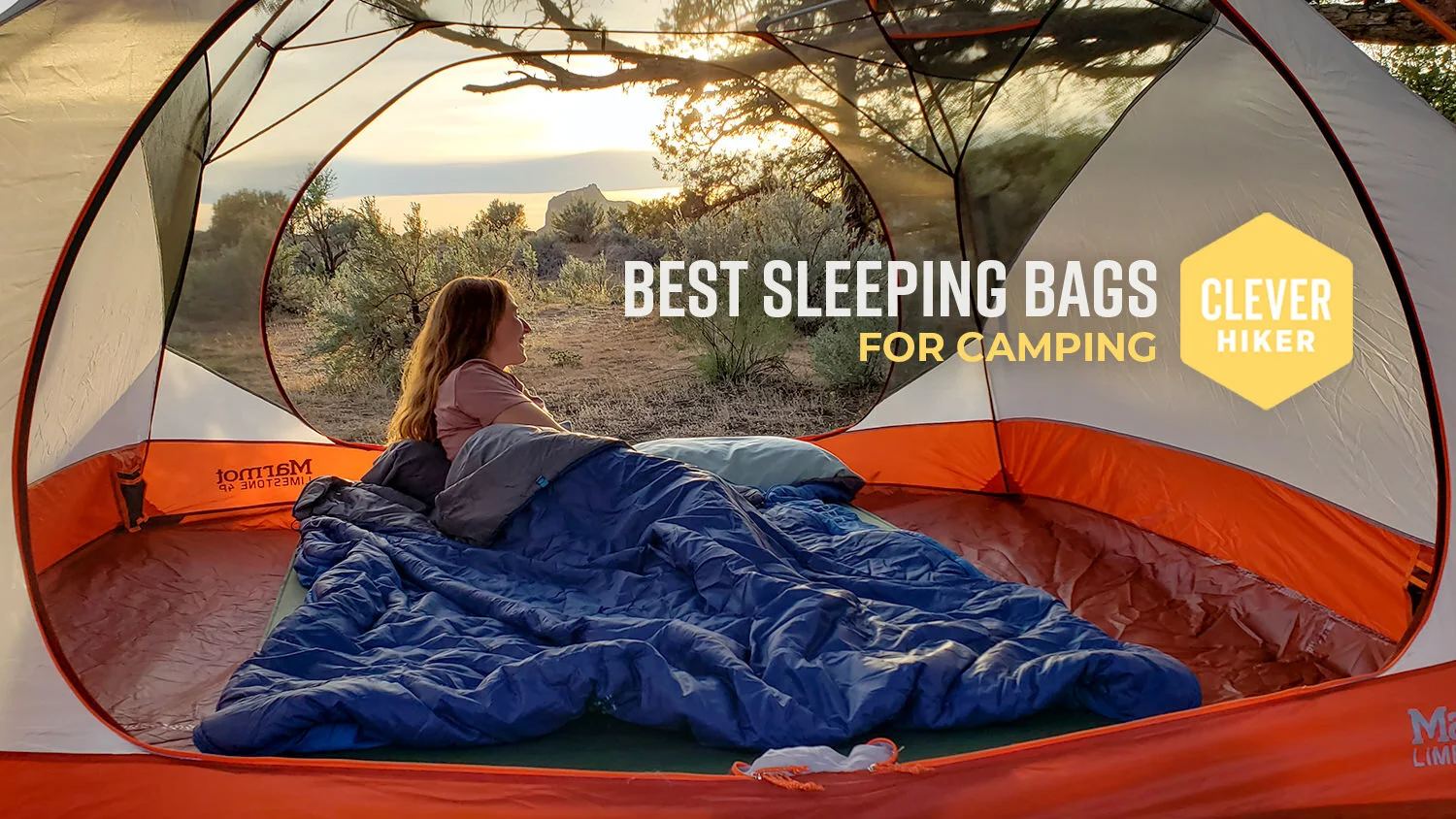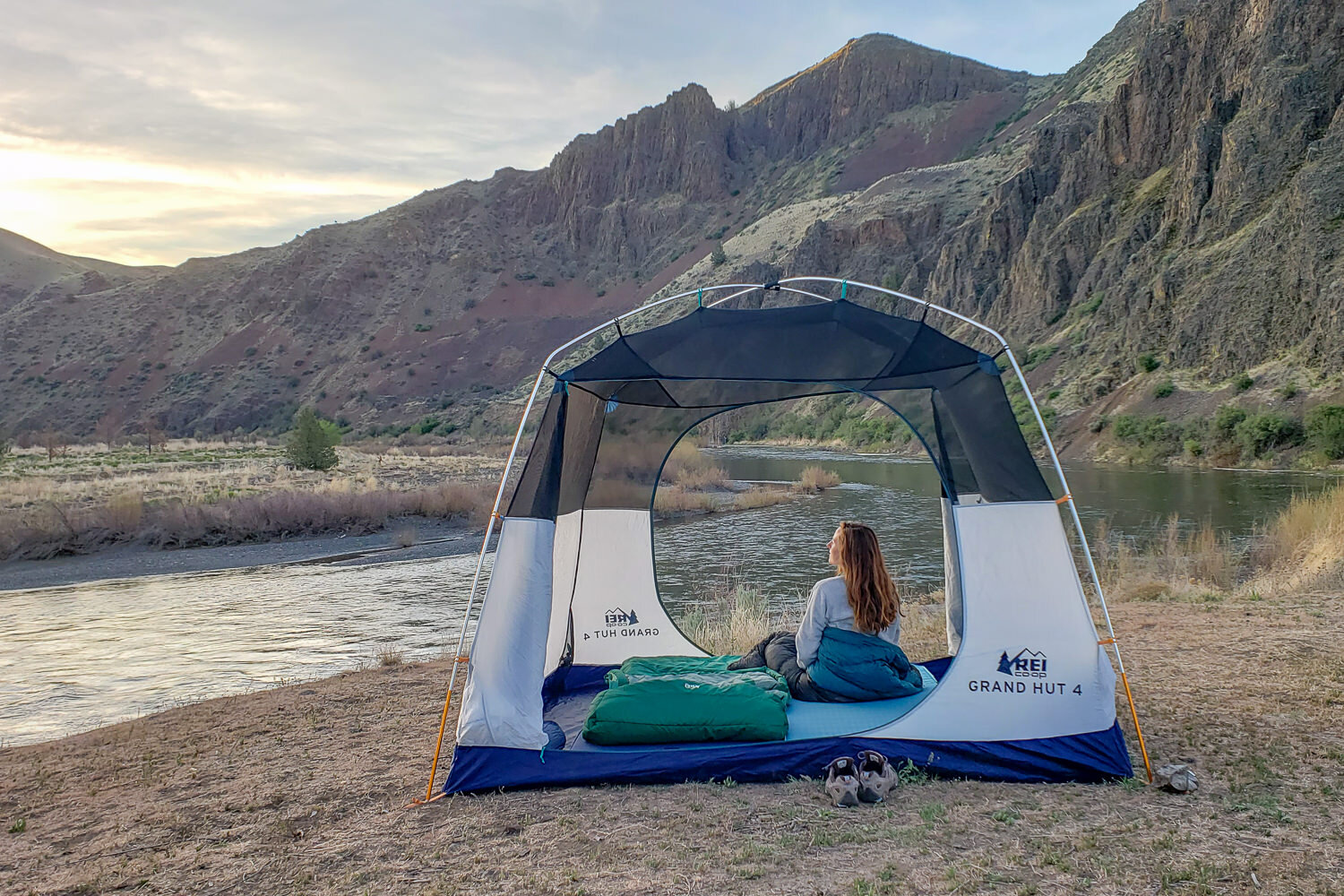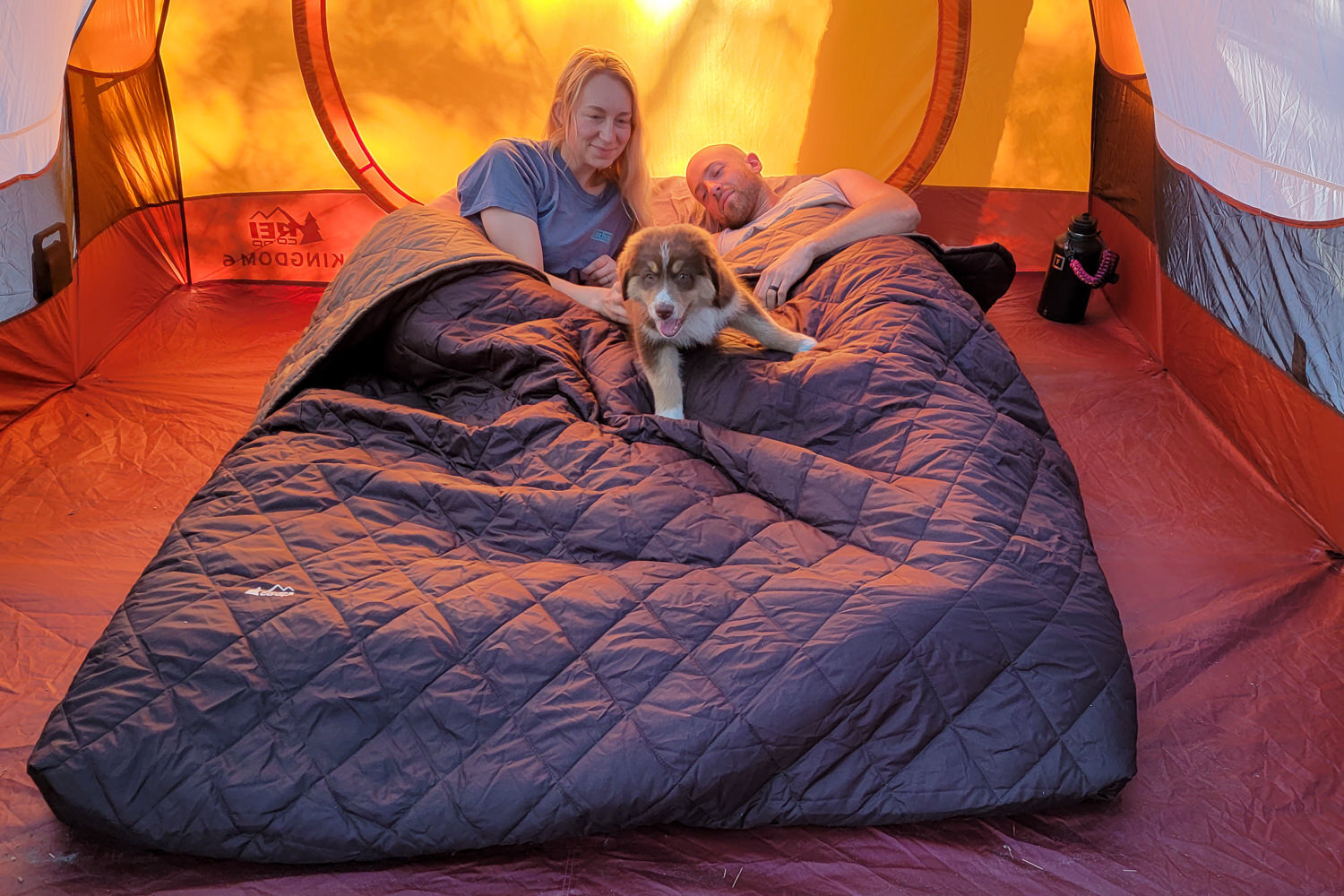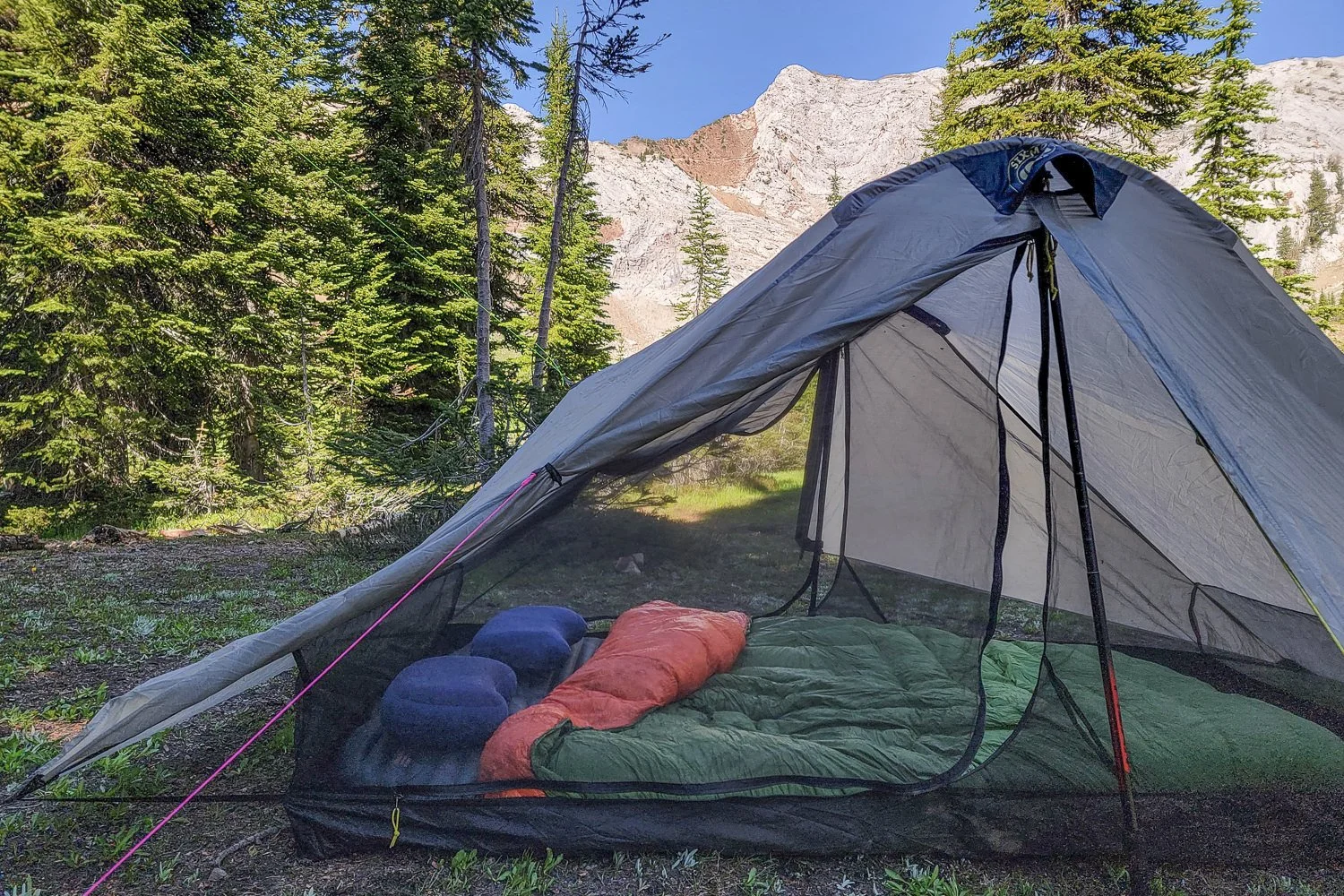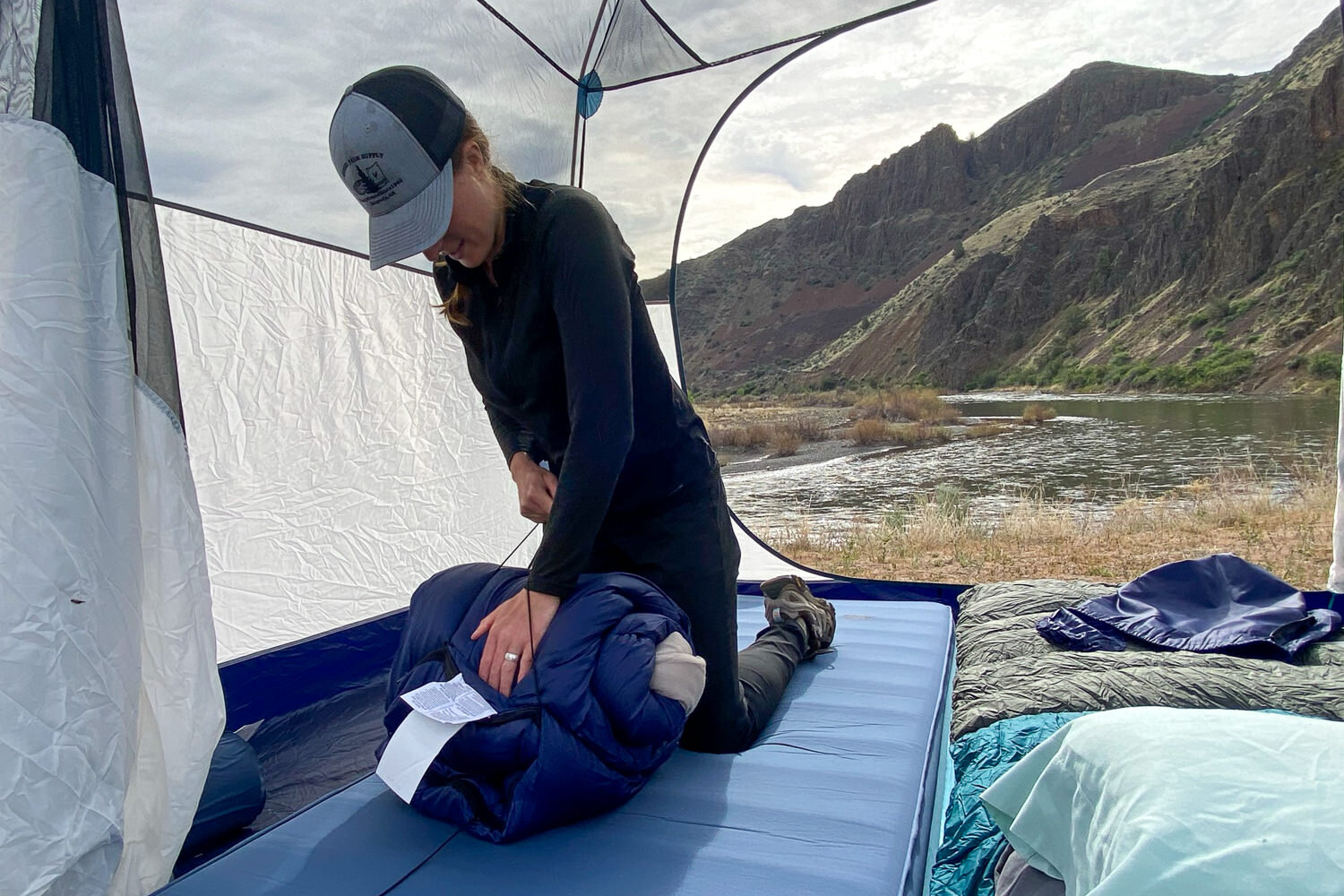A sleeping bag that’s properly suited to your trip conditions will prevent cold, uncomfortable nights of camping and help you catch blissful z’s under the stars. But finding a reliable bag is a tad trickier than you might think.
If you’re new to the world of sleeping bags, the number of options on the market can be a bit intimidating. We’ll help you navigate through temperature ratings, down vs. synthetic, double vs. single, and other important considerations to get you to the best bag for your needs.
The REI Siesta Hooded 20 & Kelty Galactic 30 are our top picks for a great balance of conveneience, comfort & price
Quick Recommendations
Check out this quick list of our favorite sleeping bags if you’re in a hurry, or continue scrolling to see our full list with in-depth reviews.
Best sleeping bag overall: REI Siesta Hooded 20
Lightweight & compact sleeping bag: Kelty Galactic 30
High-quality & affordable sleeping bag: The North Face Wawona Bed 20
Versatile bag for summer camping & backpacking: NEMO Disco 30
Lightweight sleeping bag with temperature options: Exped MegaSleep 25/40
Roomy, warm & affordable sleeping bag: Teton Sports Celsius XXL
Luxurious double sleeping bag: Big Agnes King Solomon 20
Value sleeping bag with excellent warmth-to-weight: Kelty Cosmic Down 20
Best all-in-one summer sleep system for two: REI Kingdom Sleep System 40
Best ultralight sleep system for two: Enlightened Equipment Accomplice 20
Best budget sleeping bag: Coleman Brazos
The EE Accomplice is light enough for backpacking & works well for frontcountry camping
What’s Most Important to You in a Sleeping Bag?
PRICE - Your sleeping bag will likely be one of the most expensive items you buy for camping, but it’s also one of the most important. You don't have to break the bank for a quality sleeping bag, but we find spending a little more is often worth it for the increase in durability and comfort.
Best value sleeping bags: REI Siesta Hooded 20, Kelty Galactic 30, Kelty Cosmic Down 20 & Exped MegaSleep 25/40
Best budget sleeping bags: Teton Sports Celsius XXL, The North Face Wawona Bed 20 & Coleman Brazos
Best high-end sleeping bags: NEMO Disco 30, Big Agnes King Solomon 20 & Enlightened Equipment Accomplice 20
The REI Kingdom Sleep System 40 is a complete bed system with an air mattress, sheet set & quilted blanket
COMFORT - You have the luxury of being able to bring as much gear as you want on frontcountry trips, so make comfort a priority. The sleeping bags we gravitate towards the most for car camping trips tend to be plenty warm for the conditions and have a roomy cut so we can stretch out and relax. Mummy-style bags feel more snug and warm but they can limit your movement.
Best roomy, rectangular bags: REI Siesta Hooded 20, Kelty Galactic 30, The North Face Wawona Bed 20, Exped MegaSleep 25/40, Teton Sports Celsius XXL, Enlightened Equipment Accomplice 20 & REI Kingdom Sleep System 40
Best mummy bags: NEMO Disco 30, Kelty Cosmic Down 20 & Big Agnes King Solomon 20
The REI Siesta & HunkerDown are some of our favorite car camping bags due to their comfortable, bed-like feel
WARMTH - Summer is the most popular season for car camping, so our sleeping bag recommendations are mostly in the 20-40 degree range. The number listed with the name of most sleeping bags (example: REI Siesta Hooded 20) is the Lower Limit which is usually 10-15° lower than what’s comfortable. In our experience, a 20° bag is usually comfortable for nighttime lows down to the mid-thirties. Learn more about choosing a temperature rating below the list.
Warmest bags for 3-season use: REI Siesta Hooded 20, Teton Sports Celsius XXL, Big Agnes King Solomon 20 & Enlightened Equipment Accomplice 20
Best summer bags: Kelty Galactic 30, NEMO Disco 30, Exped MegaSleep 25/40, The North Face Wawona Bed 20 & REI Kingdom Sleep System 40
The # on most sleeping bags (Ex: Kelty Cosmic Down 20) is the Lower Limit which is 10-15° lower than what’s comfortable
SINGLE VS. DOUBLE - We generally prefer to use individual sleeping bags because they offer more versatility, and it’s easier to split the weight for backpacking. Weight doesn’t matter as much for car camping trips though, and double sleep systems can be nice for pairs that prefer to be close or cuddle. Single bags with a proper fit can be warmer in really cold conditions since they have less dead air space to heat. That said, sharing body heat in a well-buttoned-up, two-person sleep system can also have heat-multiplying benefits.
Best individual bags: REI Siesta Hooded 20, Kelty Galactic 30, The North Face Wawona Bed 20, NEMO Disco 30 & Exped MegaSleep 25/40
Best double bags: REI Siesta Double, The North Face Wawona Bed Double, Exped MegaSleep Double, Big Agnes King Solomon 20, REI Kingdom Insulated Sleep System 40 & Enlightened Equipment Accomplice
The Big Agnes King Solomon 20 is one of the warmest double sleep systems on the market
WEIGHT & PACKABILITY - Keeping weight and bulk to a minimum isn’t as critical for car camping as it is for backpacking. But lighter, more compact sleeping bags are easier to transport. If you're looking for a sleeping bag that can work for both camping and backpacking, opt for one of the lightest options here, or head over to our list of the Best Backpacking Sleeping Bags.
Most packable & lightweight camping sleeping bags: Kelty Galactic 30, NEMO Disco 30, Exped MegaSleep 25/40, Big Agnes King Solomon 20 & Enlightened Equipment Accomplice 20
The Coleman Brazos (left) vs. the Kelty Galactic 30 (right)
EASE OF PACKING - If a bag is comfy to sleep in, but a pain in the neck to pack up when you’re done, it will really take away from the experience.
Easiest sleeping bags to pack/unpack: REI Siesta Hooded 20, Kelty Galactic 30, NEMO Disco 30, Exped MegaSleep 25/40, Kelty Cosmic Down 20, Big Agnes King Solomon 20 & Enlightened Equipment Accomplice 20
The Kelty Galactic is light & easy to stuff into a small bag, while the Coleman Brazos is bulky & has to be rolled tightly
DURABILITY - Sleeping bags designed for frontcountry camping are often made with heavier materials and solid zippers for added durability. That said, it’s always a good idea to have a repair kit with Tenacious Tape or nylon self-adhesive patches just in case, especially if your bag is filled with down.
Most durable sleeping bags: REI Siesta Hooded 20, Teton Sports Celsius XXL, The North Face Wawona Bed 20 & Coleman Brazos
The REI Siesta Hooded 20 & TNF Wawona Bed 20 are made with durable outer material & should last for many years
DOWN VS. SYNTHETIC - Down insulation is more expensive than synthetic but it has a better warmth-to-weight ratio and packs down smaller. Down bags also last longer than synthetic bags if taken care of properly. Synthetic bags are often heavier and bulkier than down bags, but they tend to cost less and retain heat a bit better if they get damp. In our opinion, down bags are typically better performance-wise.
Best down bags: REI HunkerDown 20, Kelty Galactic 30, NEMO Disco 30, Kelty Cosmic Down 20 & Enlightened Equipment Accomplice 20
Best synthetic bags: REI Siesta Hooded 20, Teton Sports Celsius XXL & Exped MegaSleep 25/40
Best CAMPING Sleeping Bags of 2023
BEST SLEEPING BAG OVERALL FOR COMFORT, QUALITY & PRICE
MSRP: $139 (single) / $239 (double)
TEMPERATURE RATING: 20°F
WEIGHT: 3 lbs. 10.7 oz. (single) / 7 lbs. 13 oz. (double)
PROS: Affordable, hood adds warmth, hood holds full-size pillow in place
CONS: A bit heavy/bulky
BOTTOM LINE: The REI Siesta Hooded 20 is back, and it’s better than ever. This is one of our go-to sleeping bags for car camping because it’s roomy for sprawling, durable, and comes in at a great value price. The rectangular hood adds extra warmth on chilly nights and holds a full-size bed pillow securely in place. Other small features, like a built-in stash pocket to keep your headlamp close and an extra zipper that allows you to fold the top down like a blanket, make it even more user-friendly. Overall, we love the Siesta for its affordable price point and dialed-in details that make it easy to get a great night's rest.
If you don’t mind paying a bit more to save weight and increase packability, the REI HunkerDown 20 is also an excellent choice.
LIGHTWEIGHT & COMPACT SLEEPING BAG
MSRP: $170
TEMPERATURE RATING: 30°F
WEIGHT: 2 lbs. 11 oz.
PROS: Lightweight, compact, high-quality down, easy to pack, two of these bags easily zip together
CONS: Not as warm as some (best for summer trips), down bags require special care when washing
BOTTOM LINE: The Kelty Galactic 30 is one of the only rectangle-shaped down sleeping bags designed for frontcountry users. Down bags are typically a lot more expensive than synthetic bags, and they tend to only come in a mummy-style shape that doesn’t allow you to stretch out as much. This is where the down-filled Galactic shines! It’s priced similarly to many of the high-quality synthetic bags on our list, and the rectangle shape offers plenty of room to sprawl. The Galactic also packs down super small for convenient carrying and fluffs up to provide impressive warmth for how slim and lightweight it is. If having a great balance of warmth to livability and a small packed size is ideal for you, the Galactic might be exactly what you need.
HIGH-QUALITY & AFFORDABLE SLEEPING BAG
MSRP: $130 (single) / $199 (double)
TEMPERATURE RATING: 20°F
WEIGHT: 4 lbs. 8 oz. (single) / 6 lbs. 4 oz. (double)
PROS: Affordable, lightweight, comfy fleece lining at the top
CONS: Not as warm as some (best for summer trips)
BOTTOM LINE: The North Face Wawona Bed 20 is a simple sleeping bag with a great balance of quality and price for summer trips. The rectangular shape gives it a roomy feel that’s comfortable to move and stretch out in. And the wrap-around zipper allows you the freedom to vent the bag or open it up completely to lay flat like a blanket. It also has a soft fleece interior around the top edge for extra coziness and next-to-skin comfort. While there’s nothing fancy about the Wawona Bed, it’s very well made, and we’re confident that it will last for years if treated with care. We recommend the Wawona Bed to those who prioritize comfort and affordability for their frontcountry trips.
VERSATILE BAG FOR SUMMER CAMPING & BACKPACKING
MSRP: $280
TEMPERATURE RATING: 30°F
WEIGHT: 1 lb. 15 oz. (men’s) / 2 lbs. 5 oz. (women’s)
PROS: Very lightweight, compact, hood adds warmth, high-quality down, men’s and women’s versions zip together, built-in pillow sleeve
CONS: Expensive, down bags require special care when washing
BOTTOM LINE: If you plan to do a mix of backcountry and frontcountry trips, it’s worth paying a bit more for an excellent quality sleeping bag like the NEMO Disco 30 that you can use for all kinds of adventures. This bag is made with luxurious 650-fill-power down that has a great warmth-to-weight ratio and is highly compressible so it takes up very little space when packed. The Disco offers the best of both worlds for car camping and backpacking with a relaxed, roomy fit and mummy-bag style heat efficiency.
LIGHTWEIGHT SLEEPING BAG WITH TEMPERATURE OPTIONS
MSRP: $100 (single), $200 (double)
TEMPERATURE RATING: 25°F
WEIGHT: 1 lb. 14 oz. (single), 4 lbs. 6 oz. (double)
PROS: Affordable, very lightweight, compact, multiple temperature options depending on which side faces up, convenient duffel bag, Duo can be zipped apart and used as two single bags with different temperature ratings
CONS: Not as warm as some (best for summer trips)
BOTTOM LINE: The Exped MegaSleep 25/40 is great for those who want a space-saving sleeping bag that can easily adapt to different conditions. Use the bag with the dark blue side on the top to keep you warm in temperatures in the mid-thirties, or flip it over and use it with the light blue side up for more breathability on warm summer nights. The quick-drying microfiber insulation gives the MegaSleep bag loft, but keeps it very slim and awesomely easy to pack. It’s so lightweight, it could even be used for summer backpacking trips. If you generally sleep warm and prefer a bag that’s streamlined, compact and has an airy feel, the MegaSleep might be an excellent fit.
ROOMY, WARM & AFFORDABLE SLEEPING BAG
MSRP: $105 (often on sale for less)
TEMPERATURE RATING: 15°F
WEIGHT: 7 lbs.
PROS: Spacious, affordable, compression sack included, right and left zippered bags zip together
CONS: Heavier/bulkier than some, hood is a bit small, doesn’t unzip into a blanket
BOTTOM LINE: If you’re looking for a classic flannel-lined bag for an affordable price, you’ll love the Teton Sports Celsius XXL. It’s warm, cozy, and has an exceptionally spacious interior that’s great for big and tall folks or anyone who likes a lot of room to spread out. We also love that it comes with a compression sack, which makes packing and storing it much easier. The Celsius is a traditional, comfy sleeping bag for a very reasonable price, and we recommend it to those who like a heavier, more substantial feeling bag. The Celsius is also available in Regular size for those who don’t need quite such a generous cut.
LUXURIOUS DOUBLE SLEEPING BAG
MSRP: $450
TEMPERATURE RATING: 20°F
WEIGHT: 4 lbs.
PROS: Lightweight & compact for a double, hood adds warmth, integrated sleeping pad sleeve, built-in pillow sleeve, high-quality down
CONS: Expensive, sleeves may not work with larger mattresses or pillows*, down bags require special care when washing
BOTTOM LINE: The Big Agnes King Solomon 20 sleeping bag is a great choice for pairs who want top-of-the-line comfort and quality for year-round trips. It’s insulated with 650-fill-power down for efficient warmth and packability. And it’s lightweight enough to use for a range of activities from car camping to backpacking. The built-in pad and pillow sleeves reduce slipping, and keep everything right where you want it for a more restful night. We recommend the King Solomon to couples who spend a lot of time outside together and don’t mind paying a bit more for a luxurious double sleeping bag with dialed-in details.
*The King Solomon fits any two 20"-25" wide sleeping pads or a 40" doublewide pad. Rectangular shape is recommended.
VALUE SLEEPING BAG WITH EXCELLENT WARMTH-TO-WEIGHT
MSRP: $165
TEMPERATURE RATING: 21°F
WEIGHT: 2 lbs. 10 oz. (men’s) / 3 lbs. 7 oz. (women’s)
PROS: Lightweight, compact, hood adds warmth, high-quality zipper doesn’t snag, high-quality down
CONS: Not as roomy as some, down bags require special care when washing
BOTTOM LINE: The Kelty Cosmic Down 20 Sleeping Bag is a great value sleeping bag for those who prioritize both warmth and low weight. It’s a mummy bag design, so it fits a bit tighter than a rectangle-shaped bag, but it’s more efficient at retaining heat. With its quality quick-drying fabrics and weight and size that is practical for backcountry and frontcountry use, it’s no wonder this bag has been so popular. The Cosmic Down is a great well-rounded sleeping bag that suits a variety of adventure needs without costing an arm and a leg. The Women’s Cosmic Down weighs a bit more than the men’s version and is a little more expensive, but it has more down fill since women tend to be colder sleepers.
BEST ALL-IN-ONE SUMMER SLEEP SYSTEM FOR TWO
MSRP: $299 (includes mattress, which is $149 alone)
TEMPERATURE RATING: 40°F
WEIGHT: 15 lbs. 9 oz. (includes 5 lbs. 13 oz. mattress)
PROS: Great value, includes a high-quality queen size air mattress and sheet set, bed-like feel, durable, easy to wash
CONS: Not as warm as some others (best for temps above 40°F), heavy/bulky (including mattress)
BOTTOM LINE: For couples who want to feel like they’re in a bed at home, we recommend the REI Kingdom Insulated Sleep System 40. The system includes a queen size inflatable air mattress, a fitted sheet set, and a thin quilted blanket to make a complete camping bed. The sheets allow two people to move freely without feeling restricted, and the bedding stays tucked in to eliminate drafts. When you get home, you can toss it in the washing machine so you have fresh bedding on each trip. This sleeping system is rated to 40 degrees, so it’s great for those who tend to sleep warm on summer camping trips. On cool nights, you may want to add a blanket for extra insulation. The Kingdom Sleep System is an excellent all-in-one solution that makes camping as a couple comfy and carefree.
BEST ULTRALIGHT SLEEP SYSTEM FOR TWO
MSRP: $480
TEMPERATURE RATING: 20°F
WEIGHT (Regular, 950-fill-power): 2 lbs. 1 oz.
PROS: Ultralight, compact, versatile, made with the highest quality down
CONS: Expensive, quilts can be more drafty than sleeping bags, not as durable as some, down quilts require special care when washing
BOTTOM LINE: The Enlightened Equipment Accomplice is our favorite shared sleep system for couples who need to keep weight to a minimum for ultralight backpacking. It’s also worth considering for car camping if you’re looking for an unbeatable warmth-to-weight ratio and plenty of roominess to move freely. You’ll pay more for a quilt made with the highest quality available 950-fill-power down, but the Accomplice is absolutely worth the cost for those who need maximum efficiency. When you compare it to other down double sleeping bags, it’s a great value considering the top-notch materials. The Accomplice is our favorite crossover sleep system for those that frequent the backcountry. It’s customizable too, so you can choose the exact temperature rating, size, and colors you want.
BEST BUDGET SLEEPING BAG
MSRP: $47
TEMPERATURE RATING: 30°F
WEIGHT: 5 lbs.
PROS: Very affordable, comfortable, durable, internal stash pocket
CONS: Heavier/bulkier than some, debris stick to lining, difficult to pack
BOTTOM LINE: The Coleman Brazos is an affordable sleeping bag that’s an awesome deal for those on a tight budget or families who need to pick up multiple bags. It’s warm enough for nights with lows in the 40s, so it’s perfect for average summer conditions. The Brazos has a roomy rectangular shape and a soft, comfortable interior. We recommend being diligent to keep this bag inside of a tent because debris can really cling to the lining if it comes in contact with the dirt. That said, it’s a great value for the money and a good option if you only car camp a few times a year.
We’ve used our EE Accomplice Double Quilt for a CDT thru-hike & countless camping trips - it’s still going strong!
Critical Sleeping Bag Considerations
CHOOSING A TEMPERATURE RATING - Choosing the right temperature rating isn’t an exact science. Many factors contribute to warmth, like sleeping pad/mattress insulation, clothing, hydration, nutrition, and altitude. For this list, we chose bags with temperature ratings that we felt would be a good fit for most summer trips. Most of the bags on this list will keep the average user comfortable in typical summer conditions with nightime temperatures in the 40’s. If you know you’re a hot or cold sleeper, you’ll want to adjust your choice accordingly.
TEMPERATURE RATING - The number listed with the name of most sleeping bags (example: REI Siesta Hooded 20) is the Lower Limit which is usually 10-15 degrees lower than what’s comfortable. If the bag lists a standardized EN Comfort Rating, it will give you a much more realistic idea of how it will perform. Unfortunately, it’s not common to see Comfort Ratings on frontcountry camping bags. If no comfort rating is listed, you can estimate by adding 10-15° to the temperature rating provided by the manufacturer.
INCREASING TEMPERATURE RATING - Another thing to keep in mind when choosing a sleeping bag is that you can always increase your warmth by adding layers. For example, you can use a blanket over your bag or wear a down jacket to boost your warmth. It also helps to sleep in base layers and a warm hat if it's really cold. Other tricks include eating a meal right before bed, staying well hydrated, and putting a hot water bottle inside your sleeping bag by your feet.
The REI Kingdom Insulated Sleep System 40 is great for those who tend to sleep warm on summer camping trips
WHERE DOES DOWN COME FROM? - Down is the fluffy, small plumage found underneath the outer feather layer on waterfowl birds, mostly ducks and geese. These tiny filament fibers insulate the birds and keep them warm even in frigid conditions. Most down is a byproduct of the meat industry, 70% of it coming from China.
DOWN FILL POWER - The fill power (fp) of a down bag measures the quality of the down insulation in the bag. Higher fill power down weighs less and compresses more than lower fill power down. As you might imagine, higher fill power down is also more expensive. In general, 800-fill-power and up is considered high quality down. Anything lower than that will be more cost effective, but won't have as good of a warmth-to-weight ratio.
BAG LENGTH & WIDTH - Check with the manufacturer to find the correct length sleeping bag to fit your height. If you’re on the edge, the longer size will usually be a better fit. With a quilt, consider bumping up one size for the ability to pull it over your head on really chilly nights. Mummy bags usually don’t have width options, so you’ll probably need to choose a different model if the cut is too slim. Most quilts come with the option of choosing a width, and we find that wider quilts are much more comfy if you shift around at night.
DWR - Durable water repellent is a treatment that causes water to bead up on the outer shell of a sleeping bag rather than soak in. DWR will wear off and need to be reapplied over time, but it’s a nice feature to have. It won’t make a bag anywhere near waterproof, but it does add a little extra protection.
WASHING & STORAGE - Down is a durable material, but it loses some of its efficiency if it isn’t stored properly and when it gets oily or dirty over time. If properly maintained, a down sleeping bag can last for many years. For details on down care, visit our How to Repair, Wash, Store, & Care For Your Sleeping Bag page.
The Coleman Brazos is a little tougher to pack than some of the higher-quality sleeping bags on our list
Need More Gear Advice?
If you liked this list, you’ll love the CleverHiker Gear Guide where we test and recommend tons of outdoor adventure gear from a variety of categories. here are some links to popular articles:
Why Trust Us?
We fully understand how tough it is to find trustworthy gear advice, and that’s one of the main reasons we built CleverHiker. We live for outdoor adventure, and we take these guides very seriously. Here are some of the reasons you can trust us:
Our choices are completely independent and based on personal experience.
We’ve logged over 10,000 trail miles and test outdoor gear for a living.
We own and field test every product we recommend, which is sadly not the norm.
We travel to industry trade shows to learn about upcoming product innovations.
We constantly update our guides when new products launch.
We treat our recommendations as if they were for our family and friends.
We’re lifelong learners and we’re always open to constructive criticism. If you think we’ve missed a product or got something wrong, we’d love to hear your feedback.
More Information
We hope this guide helps you find the perfect sleeping bag for your needs. If you have more questions or a suggestion, we’d love to hear from you! Sign up for our newsletter to stay updated on our latest posts then visit our Facebook page and Instagram to join the community conversation.
If you found this guide helpful, please give it a share on social media! Also, be sure to check out our CleverHiker Gear Guide to see all of our top gear picks.
Thanks for reading and happy trails!
Some of the links on this page are affiliate links, which means we may receive a modest commission if purchases are made through those links. This adds no cost to our readers and helps us keep our site up and running. Our reputation is our most important asset, which is why we only provide completely honest and unbiased recommendations.

